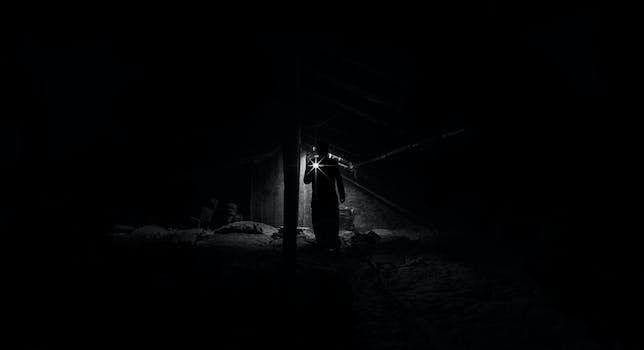Horror movies have long been a popular genre in the film industry, captivating audiences with their thrilling and suspenseful narratives. But have you ever wondered why some people enjoy the feeling of fear that comes with watching these movies? One possible explanation lies in the release of dopamine, a neurotransmitter associated with pleasure and reward. In this article, we explore the fascinating question: Do horror movies release dopamine?
- 1. Introduction
- 2. The Role of Dopamine in Horror Movies
- 2.1. Dopamine Release in Response to Fear
- 2.2. The Pleasure-Seeking Aspect
- 2.3. The Role of Suspense and Surprise
- 2.4. The Impact of Gore and Violence
- 2.5. The Importance of Psychological Thrills
- 3. The Psychological Effects of Horror Movies
1. Introduction
Horror movies have been a popular genre in the film industry for decades. With their spine-chilling plots, eerie settings, and terrifying monsters, these movies have the ability to captivate audiences and leave them on the edge of their seats. But what exactly is it about horror movies that make them so appealing to some people? One theory suggests that horror movies can release dopamine, a neurotransmitter associated with pleasure and reward. In this article, we will explore the concept of whether horror movies actually have the power to stimulate dopamine release in the brain.
1.1. The Science Behind Dopamine
Dopamine is a neurotransmitter that plays a crucial role in the brain’s reward and pleasure centers. It is often referred to as the ‘feel-good’ chemical as it is associated with feelings of pleasure, motivation, and reinforcement. Understanding the science behind dopamine can shed light on its potential connection to the effects of horror movies on our brain.
1.2. Understanding Horror Movies
Horror movies have long been a popular genre in the film industry, captivating audiences with their ability to evoke intense emotions and provoke fear. From the classic monsters of the past to the psychological thrillers of today, horror movies have a unique way of entertaining and disturbing viewers. In this article, we will delve into the world of horror movies, exploring their purpose, impact, and whether they can release dopamine in the brain.
1.3. Linking Dopamine and Fear
Dopamine, a neurotransmitter often associated with pleasure and reward, has long been a topic of interest in the field of neuroscience. Recent studies have also suggested a link between dopamine and fear, particularly in the context of watching horror movies. This intriguing connection raises the question: do horror movies release dopamine in our brains? In this article, we will delve into the relationship between dopamine and fear, exploring the potential mechanisms behind this phenomenon and examining the scientific evidence supporting it.
2. The Role of Dopamine in Horror Movies
Dopamine, a neurotransmitter in the brain, plays a crucial role in the experience of fear and pleasure, making it an essential component in the world of horror movies. When we watch a horror film, our brain releases dopamine, which contributes to the intense emotions and sensations we feel during those frightening scenes. This chemical messenger is responsible for transmitting signals between nerve cells and regulating various functions in the brain, including motivation, reward, and pleasure. In the context of horror movies, dopamine heightens our sense of anticipation, excitement, and fear, creating a thrilling and immersive experience for the audience. As we become engrossed in the plot and characters, dopamine levels increase, intensifying our emotional responses and making the horror movie-watching experience all the more engaging.
2.1. Dopamine Release in Response to Fear
Dopamine Release in Response to Fear
When it comes to horror movies, the human brain often experiences a rollercoaster of emotions. One of the key neurotransmitters involved in this process is dopamine. Dopamine is a chemical messenger that plays a crucial role in the brain’s reward and pleasure centers, and it is released in response to various stimuli, including fear.
Fear, as induced by horror movies, triggers a cascade of physiological and psychological responses in the body. As the heart rate increases and adrenaline surges, the brain activates the release of dopamine. This neurochemical response creates a sense of excitement and pleasure, which can be both thrilling and addictive for some individuals.
Research has shown that dopamine release in response to fear can vary among individuals. Some people may experience a higher release of dopamine, leading to a greater enjoyment of horror movies. On the other hand, others may have a lower dopamine response, making them less inclined to seek out such intense experiences.
The release of dopamine in horror movies also plays a role in memory formation. The heightened emotional state caused by fear enhances the encoding of memories associated with the movie-watching experience. This explains why certain scenes or moments from horror films can be vividly remembered long after the initial viewing.
In conclusion, the role of dopamine in horror movies is significant. Its release in response to fear contributes to the thrill and excitement that many individuals seek when watching these films. Understanding the neurochemical processes involved can provide insight into why some people are drawn to the genre, while others may prefer less intense forms of entertainment.
2.2. The Pleasure-Seeking Aspect
Horror movies have long been recognized for their ability to induce a range of intense emotions in viewers. One of the key aspects that contribute to the popularity of horror films is the pleasure-seeking nature of the genre. The adrenaline rush, the suspense, and the thrill that accompany watching a horror movie can be highly pleasurable for many individuals.
Dopamine, a neurotransmitter in the brain, plays a crucial role in the experience of pleasure and reward. It is often referred to as the ‘feel-good’ chemical as it is associated with feelings of happiness, pleasure, and motivation. When we engage in activities that we find pleasurable, dopamine is released in our brain, reinforcing the behavior and making us want to seek more of that pleasurable experience.
In the context of horror movies, the role of dopamine becomes particularly interesting. When we watch a horror movie, our brain goes through a roller coaster of emotions. The anticipation, fear, and suspense trigger the release of dopamine, heightening our emotional response and intensifying the overall experience. This surge of dopamine can create a sense of pleasure, even amidst the fear and discomfort.
Furthermore, horror movies often incorporate elements of surprise and shock, which can lead to an additional release of dopamine. Jump scares, unexpected plot twists, and horrifying visuals can trigger a sudden spike in dopamine levels, providing a rush of exhilaration and pleasure. This unique combination of fear and pleasure makes horror movies a captivating and addictive form of entertainment for many individuals.
In conclusion, horror movies have the ability to release dopamine in the brain, contributing to the pleasure-seeking aspect of the genre. The interplay between fear, suspense, and the release of dopamine creates a thrilling and enjoyable experience for horror movie enthusiasts. Understanding the role of dopamine in horror movies can shed light on why some individuals are drawn to this genre and find pleasure in the adrenaline-inducing scares.
2.3. The Role of Suspense and Surprise
The Role of Suspense and Surprise
In the realm of horror movies, suspense and surprise play a crucial role in creating a spine-chilling experience for the audience. These elements are carefully crafted by filmmakers to evoke intense emotions and keep viewers on the edge of their seats. Suspense is a feeling of anticipation and tension, where the audience is aware that something horrifying is about to happen but is unsure of when or how it will occur. On the other hand, surprise is a sudden and unexpected event that catches the audience off guard, often resulting in a jump scare.
The utilization of suspense and surprise triggers a physiological response in the brain, primarily involving the release of dopamine. Dopamine is a neurotransmitter associated with pleasure, reward, and motivation. When suspense is built up through eerie music, dim lighting, or mysterious happenings, the brain releases dopamine in anticipation of the impending fright. This release of dopamine heightens the audience’s emotional state, making them more responsive and engaged with the movie.
Moreover, surprise moments in horror movies generate a rapid dopamine release, intensifying the viewers’ reactions. Jump scares, sudden twists, or unexpected appearances of terrifying creatures trigger a fight-or-flight response, causing a surge of adrenaline and a flood of dopamine in the brain. This chemical reaction enhances the fear response and provides a thrilling experience for the audience.
In conclusion, suspense and surprise are vital components in horror movies, as they stimulate the release of dopamine in the brain. The combination of anticipation and unexpected events amplifies the emotional impact and engagement of viewers. By understanding the role of dopamine in horror movies, filmmakers can effectively manipulate these elements to create a truly terrifying experience.
2.4. The Impact of Gore and Violence
The impact of gore and violence in horror movies is undeniable. These elements have become a defining characteristic of the genre, captivating audiences and leaving a lasting impression. With their ability to shock and disturb, gore and violence play a crucial role in eliciting fear and exhilaration from viewers.
When it comes to horror movies, dopamine, a neurotransmitter associated with pleasure and reward, plays a significant role. Dopamine is released in the brain when we experience something thrilling or exciting. In the context of horror movies, the suspense, intense scenes, and shocking moments trigger the release of dopamine, heightening the viewer’s emotional response.
The role of dopamine in horror movies is twofold. Firstly, it contributes to the sense of enjoyment and satisfaction that viewers derive from watching these films. The release of dopamine creates a pleasurable sensation, making horror movie enthusiasts crave more of the genre.
Secondly, dopamine also acts as a coping mechanism for the intense emotions that horror movies evoke. While fear is often considered an unpleasant emotion, the release of dopamine helps to counterbalance this feeling, providing a sense of pleasure alongside the fear. This unique combination of emotions can be addictive for some individuals, as they seek out more horror movies to experience the rush of dopamine once again.
In conclusion, the impact of gore and violence in horror movies is closely intertwined with the role of dopamine. These elements not only contribute to the fear and excitement that define the genre but also trigger the release of dopamine in the brain. Understanding the relationship between horror movies, dopamine, and the emotional responses they elicit can shed light on the enduring popularity of this thrilling genre.
2.5. The Importance of Psychological Thrills
The Role of Dopamine in Horror Movies
Horror movies have long been known for their ability to evoke intense emotions and create a thrilling experience for viewers. One key element that contributes to this effect is the release of dopamine, a neurotransmitter in the brain that plays a crucial role in our feelings of pleasure and reward.
When we watch a horror movie, our brain goes through a series of reactions. As the suspense builds up and the tension increases, our body releases adrenaline, which triggers a fight-or-flight response. This physiological reaction heightens our senses and prepares us for potential danger.
Simultaneously, the brain releases dopamine in response to the thrilling and suspenseful moments in the movie. Dopamine is associated with pleasurable experiences and is often referred to as the ‘feel-good’ neurotransmitter. It creates a sense of excitement, anticipation, and pleasure, which is precisely what horror movie enthusiasts seek.
The release of dopamine during horror movies not only enhances our enjoyment but also contributes to the overall psychological experience. It helps to create a sense of reward and reinforces the thrill-seeking behavior. The more dopamine is released, the more we feel compelled to seek out similar experiences.
Additionally, dopamine plays a role in the formation of memories. When we watch a horror movie, the release of dopamine can strengthen the memory of the intense emotions we experienced during the film. This can lead to a long-lasting impact, where certain scenes or moments from the movie remain vivid in our minds, generating a lasting impression.
In conclusion, the role of dopamine in horror movies is significant. Its release during suspenseful and thrilling moments adds to the overall psychological experience, creating a sense of pleasure and reward. Understanding the impact of dopamine can help filmmakers craft more engaging and memorable horror movies that resonate with audiences on a deeper level.
3. The Psychological Effects of Horror Movies
Horror movies have long been a popular form of entertainment, captivating audiences with their thrilling plots and terrifying scenes. But beyond the immediate fear and adrenaline rush, these movies also have a deep psychological impact on viewers.
One of the most notable effects of horror movies is the release of dopamine in the brain. Dopamine is a neurotransmitter that plays a crucial role in our brain’s reward system, and it is associated with feelings of pleasure and motivation. When we watch horror movies, our brain releases dopamine in response to the suspense, fear, and excitement we experience.
This release of dopamine can create a range of psychological effects. Firstly, it can enhance our mood and provide a sense of pleasure. The adrenaline rush and heightened emotions that come with watching a horror movie can create a temporary state of euphoria, leaving us feeling exhilarated.
Additionally, the release of dopamine can also increase our arousal levels. Our heart rate and blood pressure may rise as a result of the fear and suspense, leading to a heightened state of alertness. This heightened arousal can make us more attentive and focused, increasing our engagement with the movie and intensifying our emotional response.
However, it is important to note that the psychological effects of horror movies can vary from person to person. While some individuals may find enjoyment and excitement in the release of dopamine, others may experience feelings of anxiety, stress, or even trauma. The intensity of the psychological response can depend on factors such as personal susceptibility, past experiences, and individual preferences.
In conclusion, horror movies have a profound impact on our psychology, particularly through the release of dopamine. This release can lead to feelings of pleasure, heightened arousal, and increased engagement with the movie. However, it is essential to recognize that these effects can differ among individuals, and some may have negative experiences. Ultimately, whether horror movies release dopamine or not, the psychological effects they induce make them a fascinating subject for further exploration.
3.1. Increased Heart Rate and Adrenaline
Increased Heart Rate and Adrenaline
One of the psychological effects of horror movies is the increased heart rate and adrenaline rush experienced by viewers. When exposed to intense and suspenseful scenes, the body’s natural fight-or-flight response is triggered, causing the heart to beat faster and the release of adrenaline into the bloodstream. This physiological reaction is a result of the brain perceiving a threat or danger, even though the conscious mind knows it’s only a movie. The combination of jump scares, suspenseful music, and startling visuals can create a thrilling and exhilarating experience for horror movie enthusiasts.
3.2. The Adrenaline Rush and Dopamine Release
Horror movies have long been known to elicit strong emotional responses in viewers, often leading to an adrenaline rush. This surge of adrenaline is part of the fight-or-flight response triggered by the intense and suspenseful nature of horror films. When faced with terrifying situations portrayed on screen, our bodies release adrenaline, a hormone that prepares us to either confront the threat or flee from it.
Additionally, horror movies can also result in the release of dopamine, a neurotransmitter associated with pleasure and reward. Dopamine is released in response to experiences that are exciting, pleasurable, or even mildly stressful. The suspenseful and fear-inducing elements of horror movies can stimulate the brain’s reward system, leading to the release of dopamine.
The psychological effects of horror movies can vary from person to person. For some individuals, the adrenaline rush and dopamine release can be highly enjoyable, providing a thrilling and exhilarating experience. These individuals may actively seek out horror movies as a form of entertainment and to satisfy their craving for intense emotions.
On the other hand, some people may find horror movies distressing or anxiety-provoking. The adrenaline rush and dopamine release can be overwhelming for certain individuals, causing feelings of fear, anxiety, or even panic. These individuals may choose to avoid horror movies altogether to prevent these negative psychological effects.
In conclusion, horror movies can indeed release dopamine, contributing to the overall psychological effects they have on viewers. Whether it is a source of enjoyment or distress depends on the individual’s response to adrenaline and dopamine release. Understanding these psychological effects can help individuals make informed choices about their movie preferences and ensure a more pleasurable viewing experience.
3.3. The Sense of Accomplishment and Reward
The sense of accomplishment and reward can be experienced while watching horror movies. Despite the fear and anxiety they evoke, horror movies often provide a thrilling experience that can lead to a sense of achievement. This feeling of accomplishment arises from successfully enduring the intense emotions and suspenseful moments that horror movies deliver. It is a psychological reward that stems from overcoming fear and pushing one’s boundaries. The adrenaline rush and heightened state of arousal during horror movies can create a sense of accomplishment and triumph, as the viewer navigates through the terrifying narrative.
Furthermore, horror movies often offer a cathartic release for the audience. By exposing themselves to fictional horrors, viewers can experience a release of pent-up emotions and anxieties. The intense emotions and scares experienced during the movie can serve as a form of emotional purging, allowing individuals to temporarily escape and confront their fears in a controlled environment. This release can bring a sense of relief and satisfaction, contributing to the psychological effects of horror movies.
In addition, horror movies can provide a sense of empowerment. By confronting and enduring frightening situations depicted on screen, viewers can develop a sense of resilience and empowerment. The ability to withstand the fear-inducing stimuli can boost one’s self-confidence and belief in their ability to handle challenging situations in real life. This empowerment can lead to a positive psychological impact, as individuals feel more capable and resilient after watching horror movies.
Overall, the sense of accomplishment and reward, along with the cathartic release and empowerment, are some of the psychological effects that horror movies can have on individuals. Despite the initial fear and anxiety, horror movies can offer a unique and thrilling experience that can leave viewers with a sense of achievement and psychological satisfaction.
3.4. The Cathartic Release of Negative Emotions
The cathartic release of negative emotions is one of the psychological effects of horror movies. When watching a horror movie, individuals often experience fear, anxiety, and even disgust. These intense emotions can be overwhelming, but they also offer a unique opportunity for catharsis.
Catharsis refers to the release of pent-up emotions and the subsequent feeling of relief. It is believed that horror movies provide a safe and controlled environment for individuals to experience and process their own fears and anxieties. By witnessing horrifying events on screen, viewers can momentarily escape from their own problems and confront their deepest fears in a controlled setting.
Furthermore, horror movies can trigger the release of dopamine in the brain. Dopamine is a neurotransmitter associated with pleasure and reward. It is released when we engage in activities that we find enjoyable or exciting. When watching a horror movie, the adrenaline rush and heightened suspense can stimulate the release of dopamine, creating a sense of pleasure and excitement for some individuals.
However, it’s important to note that not everyone experiences the same psychological effects while watching horror movies. Some individuals may find horror movies too distressing or anxiety-inducing, leading to negative psychological effects such as increased anxiety or nightmares. The psychological effects of horror movies can vary from person to person, depending on individual susceptibility and personal preferences.
3.5. The Long-Term Effects on Psychological Well-being
Horror movies have long been a subject of fascination for many individuals. While some may enjoy the adrenaline rush and thrill that comes with watching these films, others may find themselves deeply affected by the psychological aspects of horror movies. The intense emotions and fear that are evoked during the viewing experience can have long-term effects on an individual’s psychological well-being.
One of the main psychological effects of horror movies is the release of dopamine in the brain. Dopamine is a neurotransmitter that is associated with pleasure and reward. When we watch a horror movie, our brain releases dopamine in response to the suspense, fear, and excitement that we experience. This release of dopamine can create a sense of pleasure and enjoyment for some individuals.
However, the long-term effects of this dopamine release are not fully understood. Some research suggests that repeated exposure to horror movies and the consequent release of dopamine can desensitize individuals to fear and violence. This desensitization can lead to a decreased emotional response to real-life situations that would normally elicit fear or distress.
Additionally, the intense emotions and fear experienced during horror movies can also trigger anxiety and stress in susceptible individuals. This can result in long-term psychological effects such as increased levels of anxiety disorders or post-traumatic stress disorder (PTSD). Individuals who are already prone to anxiety or have a history of trauma may be more susceptible to these negative psychological effects.
In conclusion, horror movies can have both short-term and long-term effects on an individual’s psychological well-being. While the release of dopamine during the viewing experience can provide a sense of pleasure and enjoyment, repeated exposure to horror movies may lead to desensitization and decreased emotional response. Furthermore, the intense emotions and fear evoked by horror movies can trigger anxiety and stress, potentially leading to long-term psychological disorders. It is important for individuals to be mindful of their own psychological responses to horror movies and to seek support if they find themselves negatively affected.
Conclusion
In conclusion, horror movies have the ability to release dopamine in viewers, providing them with a thrilling and exhilarating experience.






8 Comments
Lulu Kahn
7 months agoWow, this article really caught my attention! Its fascinating to explore the connection between horror movies and dopamine release in the brain. Understanding the science behind why these films can both thrill and entertain us is mind-boggling. Cant wait to dive deeper into this intriguing topic!
Dora Jilleen
7 months agoHorror movies have long captivated audiences with their ability to evoke intense emotions and sensations. The connection between horror movies and dopamine release in the brain is a fascinating topic of scientific exploration. Dopamine, a neurotransmitter, plays a crucial role in regulating pleasure, motivation, and reward in the brain.
When exposed to horror movies, the brain undergoes a complex series of reactions. Upon encountering fear-inducing stimuli, the amygdala, an almond-shaped structure involved in emotional processing, becomes activated. This triggers a cascade of events leading to the release of dopamine in the brains reward pathways, particularly in the nucleus accumbens.
Dopamine release in response to fear and suspenseful moments heightens the overall experience of watching horror movies. It contributes to the sensation of thrill, excitement, and pleasure that many individuals derive from these films. The increased dopamine levels promote a sense of reward and reinforce the enjoyment of the scary situations presented on screen.
Moreover, the release of dopamine during horror movie viewing can also activate the brains stress response system. This leads to the release of adrenaline and cortisol, which further intensify the physiological arousal and enhance the overall emotional experience. The combination of increased dopamine and stress hormones creates a unique blend of fear and pleasure that keeps audiences engaged and entertained.
Understanding the scientific basis behind the thrill and entertainment of horror films sheds light on the complex interplay between our brains reward system, emotions, and our innate fascination with fear. Further research in this field may provide insights into how horror movies can be used for therapeutic purposes or how they contribute to our understanding of human psychology.
Lianne Haugen
7 months agoWho knew that getting scared out of your wits could actually be good for you? Turns out, horror movies have found a way to tap into our brains dopamine factory! Its like a rollercoaster ride for our neurotransmitters. So, the next time youre binging on creepy flicks, just remember, youre not a horror movie enthusiast, youre a dopamine connoisseur! Now, if only I could find a way to get the same rush from doing my taxes…
Constantine Pope
7 months agoThis post is truly intriguing and offers a fascinating exploration into the relationship between horror movies and dopamine release in the brain. It delves into the scientific aspects underlying the thrill and entertainment that these films provide. I am eager to delve deeper into this subject and learn more about the intricate connection between our brain chemistry and the captivating world of horror.
Konstance Schlosser
7 months ago{
comment: The connection between horror movies and dopamine release in the brain is a fascinating area of study. Research suggests that when individuals watch horror films, their brain releases dopamine, a neurotransmitter associated with pleasure and reward. This release of dopamine is thought to be responsible for the thrill and entertainment experienced while watching horror films. Understanding the science behind this phenomenon can provide insights into why people are drawn to horror movies and the physiological effects they have on the brain.
}
Deloris Reo
7 months agoWell, well, well, looks like were about to unravel the dark secrets behind horror movies! *Cue spooky music* I must say, this sounds like a bloody good time. So, let me get this straight, our brains are releasing dopamine while we watch someone get chased by a chainsaw-wielding maniac? Talk about a thrilling rollercoaster ride! Its like our brains are saying, Hey, lets get scared out of our wits and have a blast while were at it! Who knew our brains were such adrenaline junkies? Pass the popcorn, Im ready for this mind-bending horror-fest!
Fina Shandeigh
7 months agoAs a normal human visitor, I find the connection between horror movies and dopamine release in the brain to be a fascinating subject. It is intriguing to explore the science behind the thrill and entertainment that horror films provide. Understanding how our brain reacts to fear and suspense can shed light on why we are drawn to these intense cinematic experiences. I look forward to delving deeper into this topic and unraveling the mysteries behind our dopamine-driven enjoyment of horror movies.
Jermaine Smallman
7 months ago{
comment: The connection between horror movies and dopamine release in the brain is a fascinating subject to explore. Horror films are known to elicit strong emotional reactions, including fear and excitement, which can trigger the release of dopamine in the brain. Dopamine is a neurotransmitter that plays a crucial role in the brains reward and pleasure pathways. When individuals experience fear or suspense while watching a horror movie, it activates the amygdala, the brain region responsible for processing emotions. The amygdala then communicates with the hypothalamus, triggering the release of dopamine. This release of dopamine creates a sense of pleasure and reward, leading to an enhanced sense of thrill and entertainment. Understanding the science behind this phenomenon can shed light on why horror movies have such a strong impact on our emotions and why they continue to be a popular genre in the film industry.
}